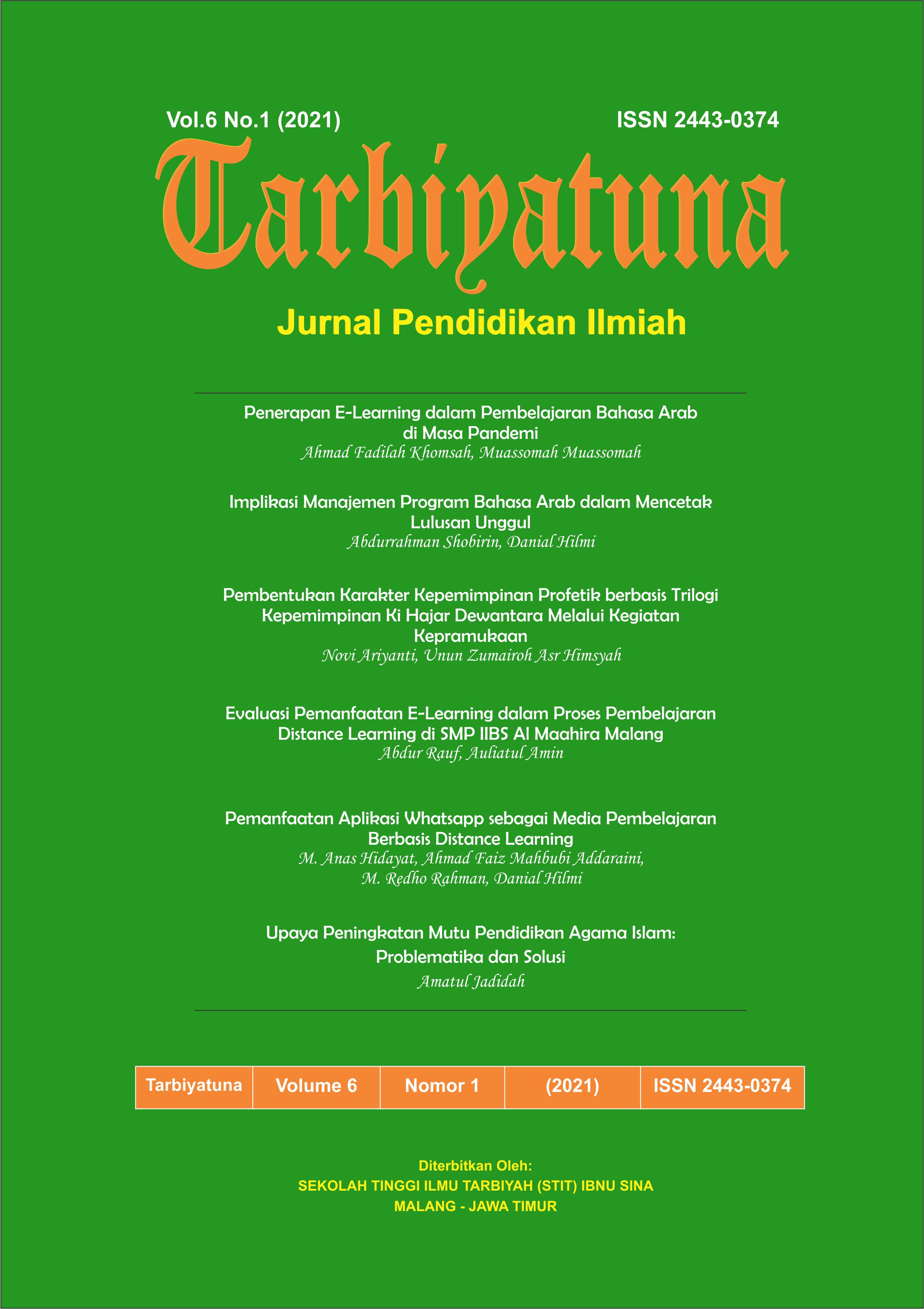Pembentukan Karakter Kepemimpinan Profetik Berbasis Trilogi Kepemimpinan Ki Hajar Dewantara melalui Kegiatan Kepramukaan
Abstract
This research is motivated by the unique activities of scouts at SMA 45 Purwodadi which are oriented to the formation of leadership characters. The research method used is descriptive qualitative with a case study approach. Through data collection techniques using interviews, observation and documentation, the research seeks to reveal the system used in the formation of leadership character, along with the supporting and inhibiting factors. The results show that the implementation of scouting activities uses the ‘Among’ system which reflects the trilogy values ​​of ‘Ing Ngarso sung Tulodo, Ing madya mangun Karso and Tut wuri Handayani’, meaning that the front gives an example, the middle gives encouragement and the back always encourages. The leadership character is strived to be formed through 5 activities: 1) unit leader rehearsal 2) upgrading, seminars and workshops, 3) Persami 4) Community service camp, and 5) Scout Action Unit (SAKA), so that a prophetic leadership character is formed by increasing knowledge, skills, and abilities. experience and life skills, which adhere to the characteristics of the Prophet, namely ‘Shidiq’, ‘Amanah’, ‘Tabligh’ and ‘Fathanah’. Support and commitment from schools, reliable and experienced scout coaches and synergistic relationships are supporting factors in the formation of leadership characteristics. Meanwhile, student motivation and lack of infrastructure are part of the inhibiting factors that become the material for evaluation and improvement for SMA 45 Purwodadi.
References
Bahtiar, Reza Syehma. BUKU AJAR PENGEMBANGAN KEPRAMUKAAN. UWKS Press, 2018.
Budiharto, Sus, dan Fathul Himam. “Konstruk teoritis dan pengukuran kepemimpinan profetik.†Jurnal Psikologi 33, no. 2 (2006): 133–45.
Dault, Adhyaksa. Kursus Pembina Pramuka Mahir Tingkat Dasar. Jakarta: Kwartir Nasional Gerakan Pramuka, 2011.
Djalaluddin, A. Manajemen Qur’ani: Menerjemahkan Idarah Ilahiyah dalam Kehidupan. Malang: UIN-Maliki Press, 2014.
Indonesia, Pramuka. “Landasan Hukum Gerakan Pramuka Indonesia.†Diakses 1 Juli 2021. https://www.pramukaindonesia.com/2014/11/landasan-hukum-gerakan-pramuka-indonesia.html.
Indonesia, Presiden Republik. “Undang-undang Republik Indonesia nomor 20 tahun 2003 tentang sistem pendidikan nasional.†Jakarta: Pemerintah Republik Indonesia, 2003.
Kumparan. “Kinerja KPK di 2019: 21 OTT hingga Jerat 146 Tersangka.†kumparan. Diakses 1 Juli 2021. https://kumparan.com/kumparannews/kinerja-kpk-di-2019-21-ott-hingga-jerat-146-tersangka-1tssjLwflDD.
Maktumah, Luluk, dan Minhaji Minhaji. “Prophetic Leadership dan Implementasinya dalam Lembaga Pendidikan Islam.†Jurnal Pendidikan Islam Indonesia 4, no. 2 (2020): 133–48.
Miles, Matthew B., A. Michael Huberman, dan Johnny Saldaña. Qualitative Data Analysis: A Methods Sourcebook. 3 ed. United States of America: Sage Publications, Inc, 2014.
Nasukah, Binti, Roni Harsoyo, dan Endah Winarti. “Internalisasi nilai-nilai kepemimpinan profetik di lembaga pendidikan Islam.†Dirasat: Jurnal Manajemen dan Pendidikan Islam 6, no. 1 (2020): 52–68.
Pramana, Herdi Bangkit Pandu Puri. “Pedoman Resmi Gerakan Pramuka.†Yogyakarta: Forum Tentor Indonesia, 2017.
Rahardjo, Suparto. Ki Hajar Dewantara: Biografi Singkat, 1889-1959. Yogyakarta: Garasi, 2009.
Sahadi, Sahadi, Otong Husni Taufiq, dan Ari Kusumah Wardani. “KARAKTER KEPEMIMPINAN IDEAL DALAM ORGANISASI.†Moderat: Jurnal Ilmiah Ilmu Pemerintahan 6, no. 3 (2020): 513–24.
Senang. Kepemimpinan dan Supervisi Pendidikan Islam. Malang: Madani, 2018.
Syani, Abdul. Sosiologi skematika, teori, dan terapan. Jakarta: Bumi Aksara, 2007.
Yuliati, Susi, ed. Panduan Penyelesaian Syarat Kecakapan Umum Pramuak Golongan Penegak. Jakarta: Kwartir Nasional Gerakan Pramuka, 2011.

